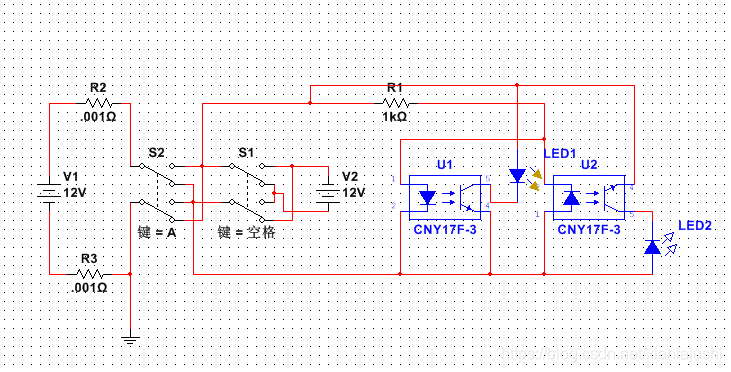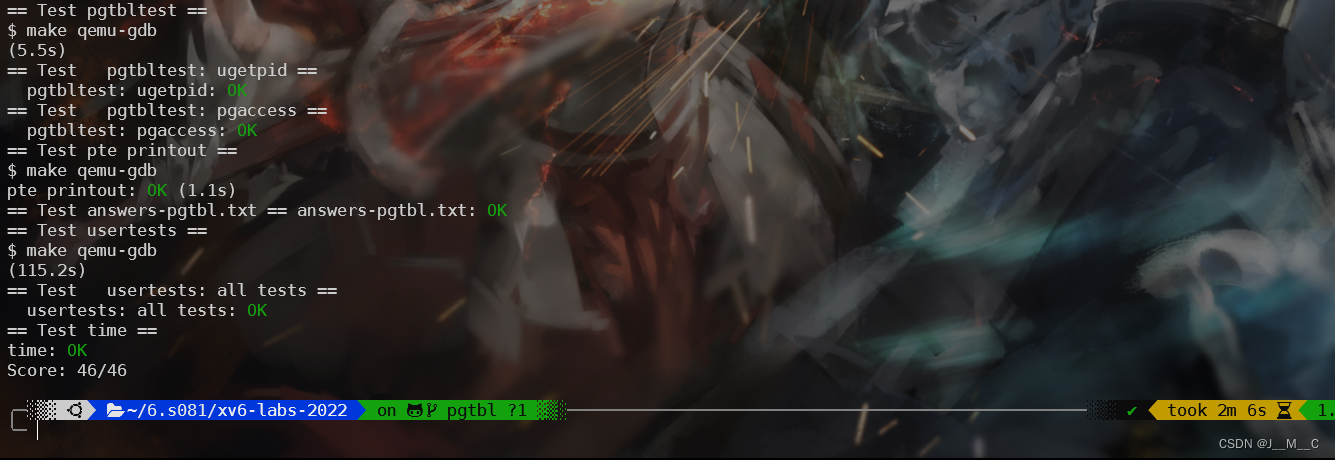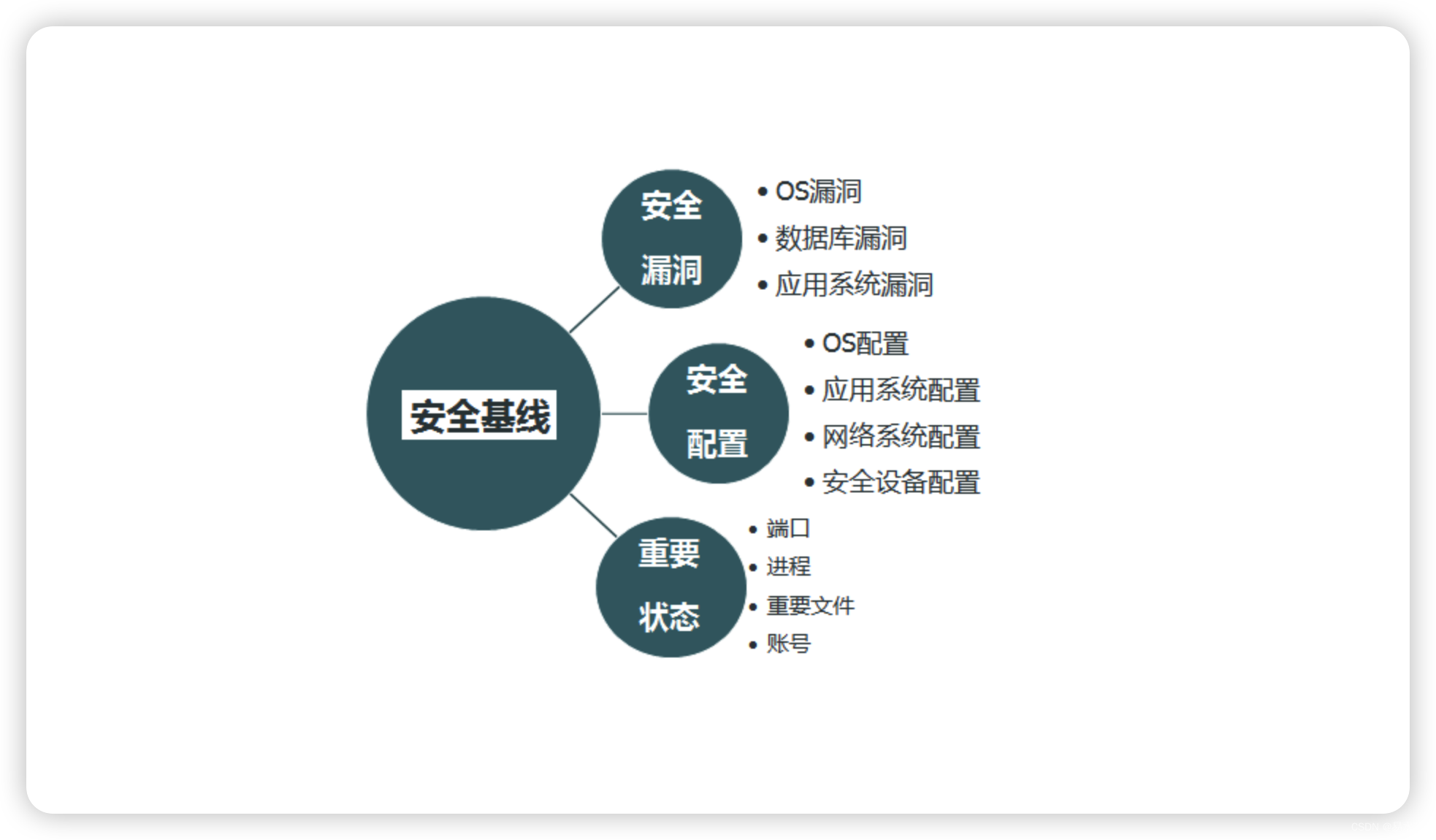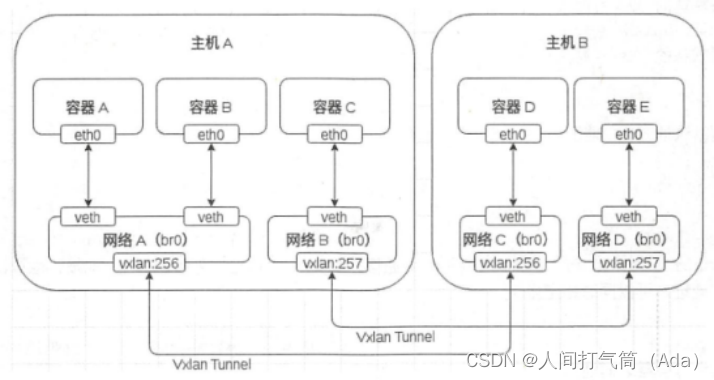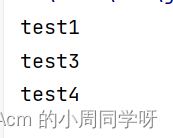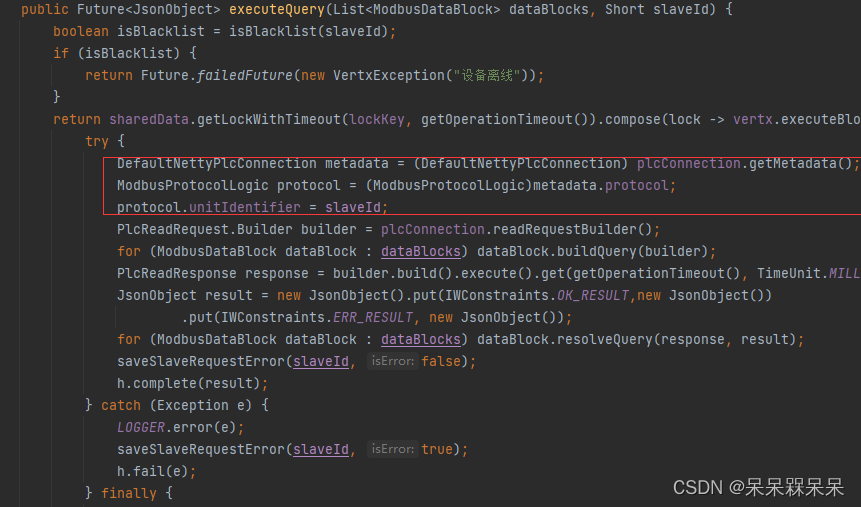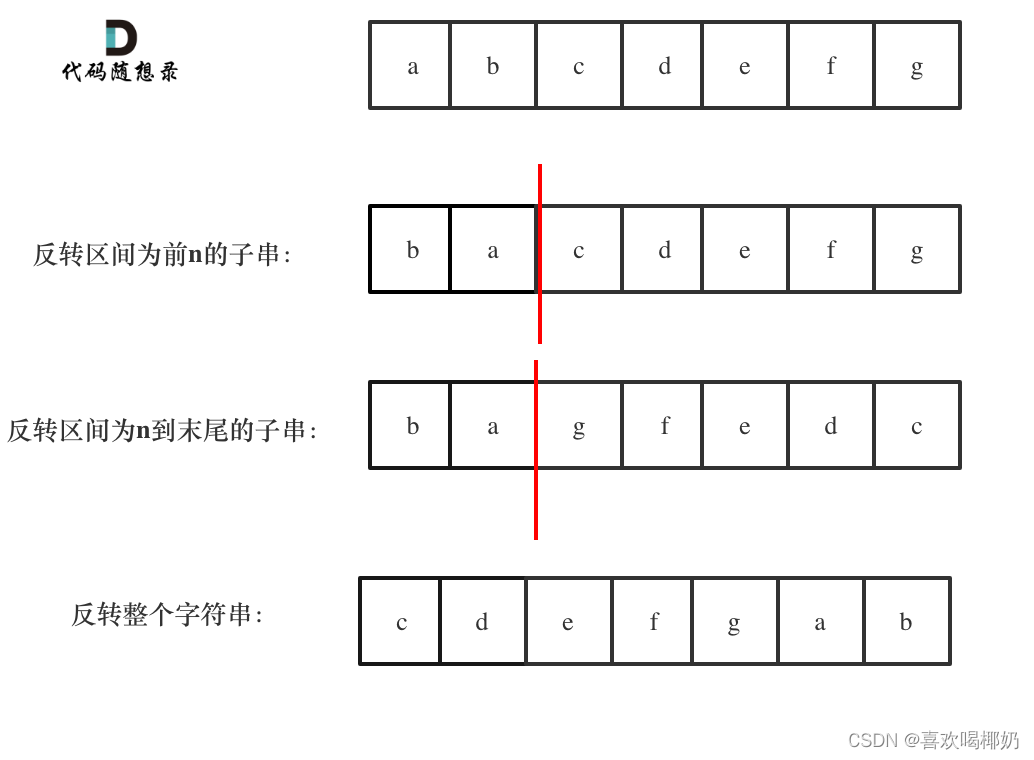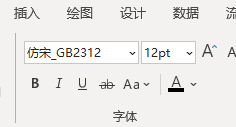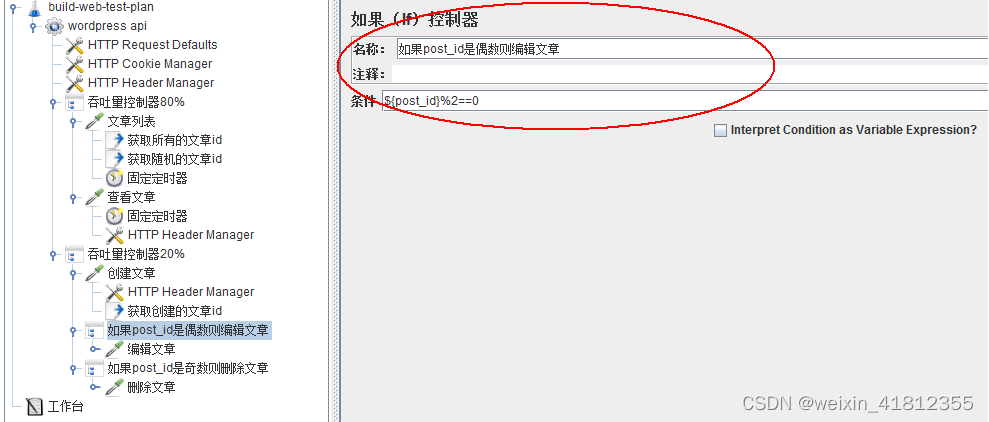目录
友元机制和运算符重载
友元机制
友元函数
友元的作用
友元类
前置声明
友元类的注意事项
友元成员函数(类的某个成员函数 作为另一个类的友元)
运算符重载
运算符重载的作用
运算符重载的注意事项
运算符重载的实现
成员函数重载
友元函数重载
运算符重载规则
重载“=”运算符
重载"<"、">"运算符
重载"++"运算符
先自加再使用
先使用后自加
重载"+"运算符
重载"[ ]"运算符
重载"->"运算符
流运算符重载
重载函数调用运算符"()"(了解)
类型转换运算符(详解)
以bool类型转换作为引入
类型转换运算符详解
补充(内置类)
实例(内置类实现C++链表封装)
友元机制和运算符重载
友元机制

友元函数
比如下面这种情况:在func中每次打印num都需要调用get_num函数,函数的调用和销毁浪费了大量的运行时间(即函数不是类的一部分,但又需要频繁地访问类的数据成员)
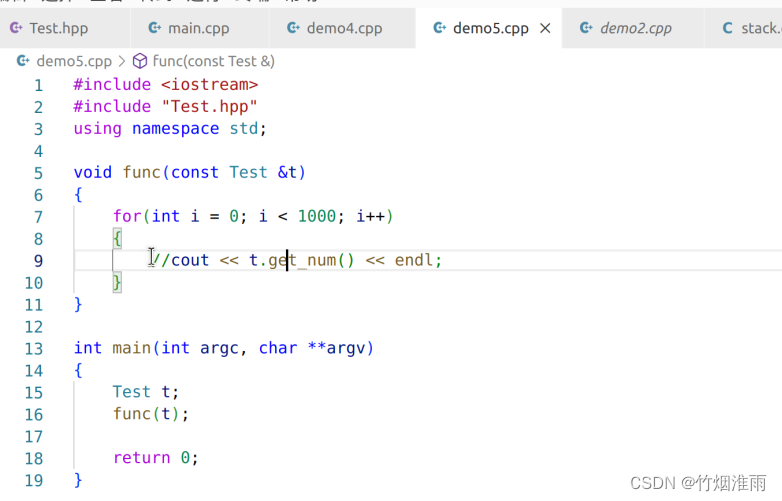
因此C++提出了友元的概念

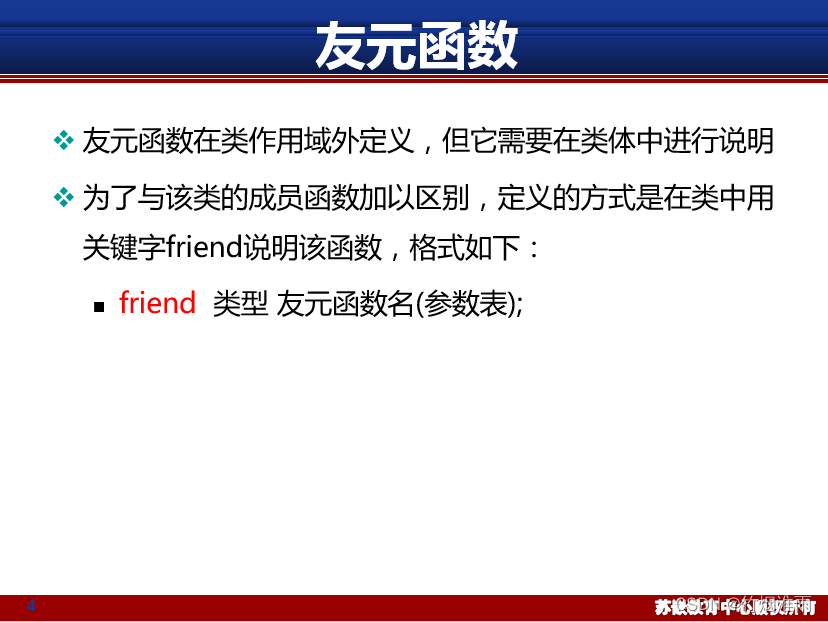

什么样的函数为友元函数?
函数不是类的一部分,但又需要频繁地访问类的数据成员
友元的作用
友元的作用:类的非成员函数可以直接访问类的非公有成员变量,省去函数的调用和访回过程。从而提高了程序的运行效率(即减少了类型和安全性检查及调用的时间开销)
友元类
前置声明
![]()
前置声明:只是单纯声明有这个类,但是不知道这个类的具体构造;
只可以利用类型名声明指针和引用变量,不能实例并访问类的内部构造;
若需要利用指针或引用调用前置类型的接口,必须按照声明和实现分离的方式进行编码。(后置实现)
注意:注意类声明的顺序;
友元类的注意事项

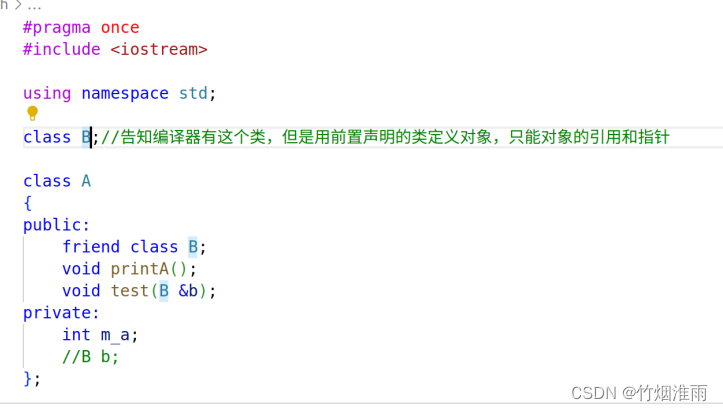
友元成员函数(类的某个成员函数 作为另一个类的友元)
友元成员函数:即让当前类的某个函数成为另一个类的友元函数,这样就可以在当前类的这个函数中访问另一个类的私有成员
注意事项:通过前置声明使用类的方法必须在前置类定义之后初始化,不能互为友元成员函数
class Room;//向前声明 只能说明类名称
class goodGay
{
public:
void visiting01(Room &room);
void visiting02(Room &room);
};
class Room
{
friend void goodGay::visiting02(Room &room);
private:
string bedRoom;//卧室
public:
string setingRoom;//客厅
public:
Room(string bedRoom, string setingRoom)
{
this‐>bedRoom = bedRoom;
this‐>setingRoom = setingRoom;
}
};
int main(int argc, char *argv[])
{
Room room("吴维的卧室","吴维的客厅");
goodGay ob;
ob.visiting01(room);
ob.visiting02(room);
return 0;
}
void goodGay::visiting01(Room &room)
{
cout<<"翰文访问了"<<room.setingRoom<<endl;
//cout<<"翰文访问了"<<room.bedRoom<<endl;
}
void goodGay::visiting02(Room &room)
{
cout<<"好基友张三访问了"<<room.setingRoom<<endl;
cout<<"好基友张三访问了"<<room.bedRoom<<endl;
}

运算符重载
可以通过函数参数的不同可以实现一个运算符任意方法的重载
运算符重载的作用
- 可以提高程序的可读性
- 体现了C++的可扩充性
- 运算符重载仅仅只是语法上的方便,它是另一种函数调用的方式
- 运算符重载,本质上是函数重载
运算符重载的注意事项
不要滥用重载、因为它只是语法上的方便,所以只有在涉及的代码更容易写、尤其是更易读时才有必要重载
运算符重载的实现
成员函数重载
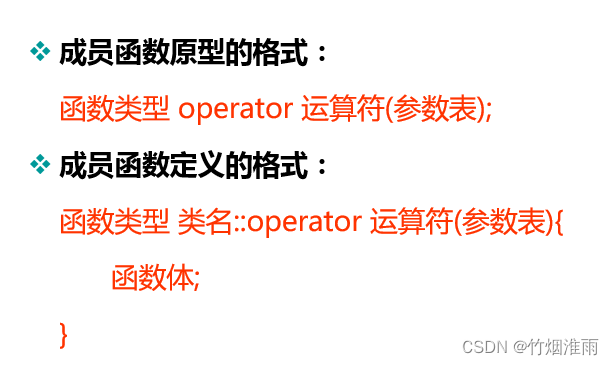
友元函数重载
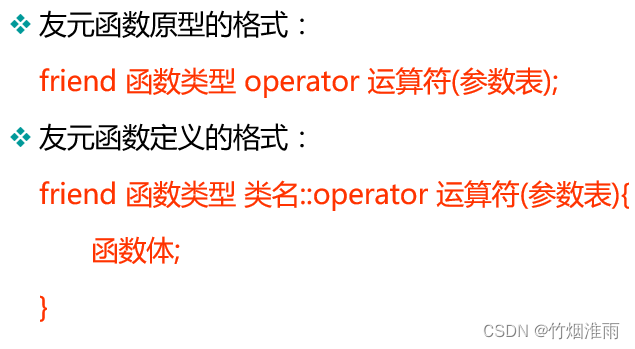
运算符重载规则
- 运算符重载不允许发明新的运算符
- 不能改变运算符操作对象的个数
- 运算符被重载后,其优先级和结合性不会改变
- 不能重载的运算符
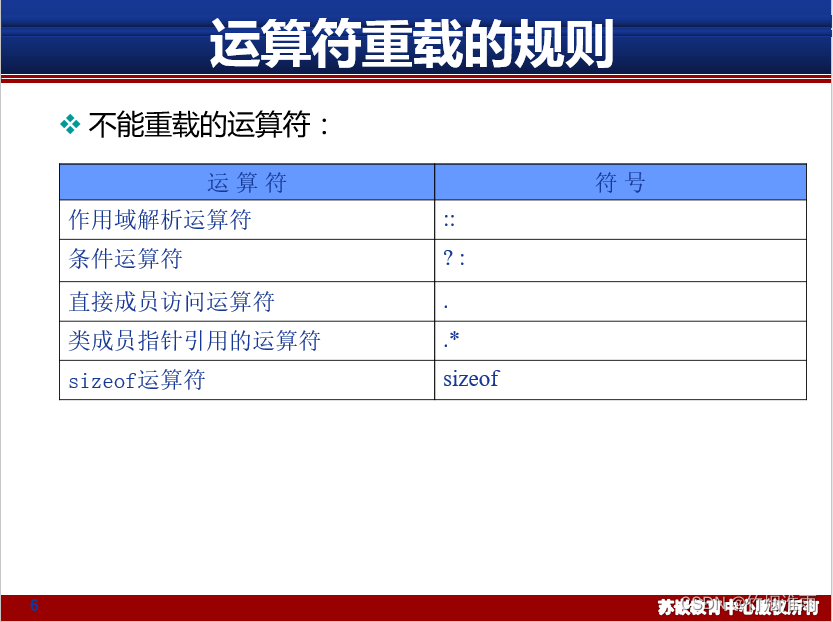
- 成员函数重载和友元函数重载的选择
- 一般情况下,单目运算符最好重载为类的成员函数;双目运算符则最好重载为类的友元函数。
- 以下一些双目运算符不能重载为类的友元函数:=、()、[ ]、->。
- 类型转换运算符只能以成员函数方式重载
- 流运算符只能以友元的方式重载
重载“=”运算符
MyString &MyString::operator=(MyString ob)
{
//str2 = str1;
if(this->str != NULL)
{
delete [] this->str;
this->str = NULL;
}
this->size = ob.size;
this->str = new char[this->size+1];
memset(this->str, 0, this->size+1);
strcpy(this->str, ob.str);
return *this;
}
MyString &MyString::operator=(char *str)
{
//str2 = str1;
if(this->str != NULL)
{
delete [] this->str;
this->str = NULL;
}
this->size = strlen(str);
this->str = new char[this->size+1];
memset(this->str, 0, this->size+1);
strcpy(this->str, str);
return *this;
} 类的赋值运算符 “=” 只能重载为成员函数,而不能把它重载为友元函数,具体原因见:赋值运算符"="的重载![]() https://blog.csdn.net/aaqian1/article/details/86423858
https://blog.csdn.net/aaqian1/article/details/86423858
重载"<"、">"运算符
bool MyString::operator>(MyString ob)
{
if(str==NULL || ob.str == NULL)
{
exit(-1);
}
if(strcmp(this->str, ob.str) > 0)
{
return true;
}
return false;
}
bool MyString::operator>(char *str)
{
if(this->str==NULL || str == NULL)
{
exit(-1);
}
if(strcmp(this->str, str) > 0)
{
return true;
}
return false;
}
bool MyString::operator<(char *str)
{
if(this->str==NULL || str == NULL)
{
_Exit(-1);
}
if(strcmp(this->str,str)<0)
{
return true;
}
return false;
}
bool operator<(const MyString &ob1, const MyString &ob2)
{
if(ob1.str==NULL || ob2.str == NULL)
{
_Exit(-1);
}
if(strcmp(ob1.str,ob2.str)<0)
{
return true;
}
return false;
}运行结果:
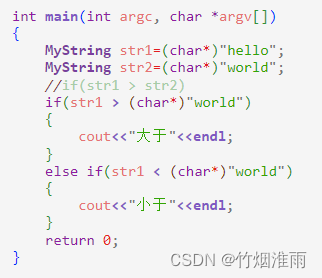


重载"++"运算符
实例:Integer类(友元和成员函数重载方式)
先自加再使用
成员函数重载

友元函数重载

先使用后自加
成员函数重载

友元函数重载

重载"+"运算符
MyString operator+(const MyString &ob1,const MyString &ob2)
{
MyString tmp;
tmp.size = ob1.size+ob2.size;
tmp.str = new char[tmp.size+1];
memset(tmp.str, 0, tmp.size+1);
strcpy(tmp.str, ob1.str);
strcat(tmp.str, ob2.str);
return tmp;
}
MyString MyString::operator+(char *str)
{
MyString tmp;
tmp.size = size+strlen(str);
tmp.str = new char[tmp.size+1];
memset(tmp.str, 0, tmp.size+1);
strcpy(tmp.str, this->str);
strcat(tmp.str, str);
return tmp;
}重载"[ ]"运算符
char& MyString::operator[](int pos)
{
if(pos<0 || pos>=size)
{
cout<<"元素位置不合法"<<endl;
exit(-1);
}
return str[pos];
}重载"->"运算符
->重载实现访问类中内置成员类里的某个成员
如下所示LinkIterator类和Node类同属于Link类的内置类,在main函数中实例化一个Link类对象指针,如果没有重载"->",对象指针将无法访问Node类中的私有成员m_num和next。但是由于Link类中有一个Node类的成员对象指针m_p。因此通过在Link类中重载"->",返回m_p,那么在main函数中的Link类对象指针就可以通过"->"访问到m_p中的m_num和next。

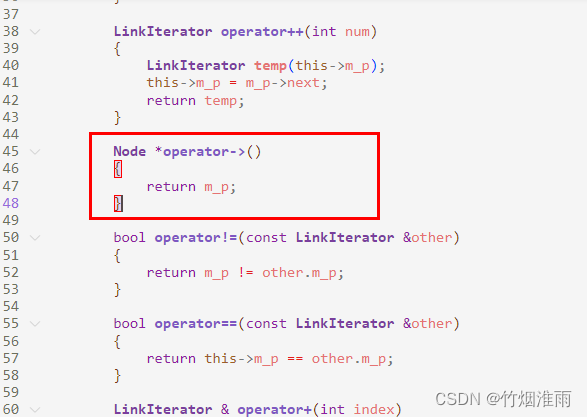
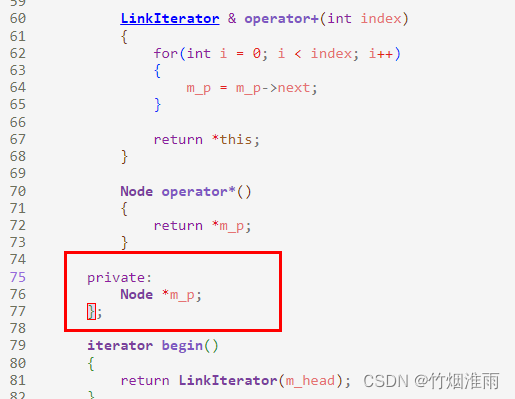
流运算符重载
如果采用成员函数的方法,由于是cout的成员,因此不能当前在类中实现重载。所以只能采用第二种方法。


流运算符>为内部类,不能通过类内成员函数重载的方法来实现,只能通过友元函数的方法来实现。
//全局函数实现 <<重载
ostream& operator<<(ostream &out, MyString ob)
{
out<<ob.str;
return out;
}
//全局函数实现 >>重载
istream& operator>>(istream &in, MyString &ob)
{
char buf[1024]="";
cin>>buf;
if(ob.str != NULL)//ob已经有字符串
{
delete [] ob.str;
ob.str = NULL;
}
ob.size = strlen(buf);
ob.str = new char[ob.size+1];
memset(ob.str, 0,ob.size+1);
strcpy(ob.str, buf);
return in;
}重载函数调用运算符"()"(了解)
重载()运算符 一般用于 为算法 提供策略。
以重载()用于输出信息为例:
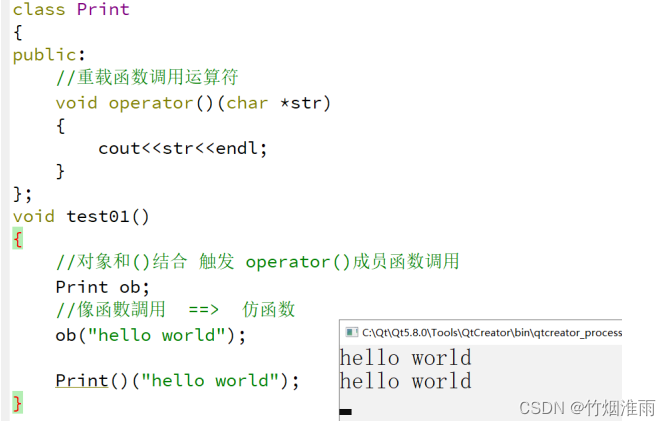
类型转换运算符(详解)
以bool类型转换作为引入
在MyString类中定义了bool类型转换函数,在main函数中实例化MyString对象的时候会隐式地将MyString类型转到bool的类型。

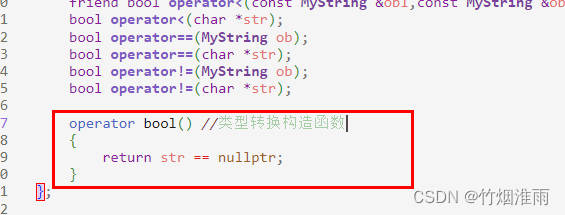
PS:类型的true还是false由bool类型转换构造函数中的具体返回值来确定
如果str1中的str不为空,则打印str中的内容:
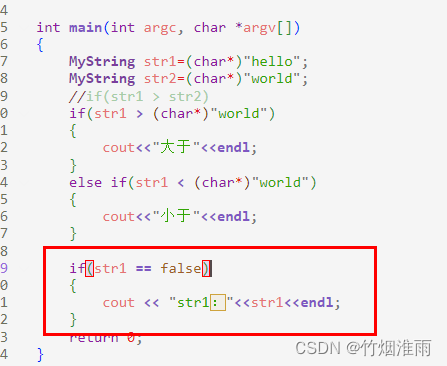
输出结果如下:

类型转换运算符详解
类型转换运算符(conversion operator)是类的一种特殊成员函数,它负责将一个类类型的值转换成其他类型。类型转换函数的一般形式是:
operator type() const;其中,type表示转换目标类型,除了void、数组或函数类型,但允许转换成指针(包括数组指针及函数指针)。类型转换运算符既没有显式的返回类型,也没有形参,而且必须定义为类的成员函数。类型转换运算符通常不应该改变待转换对象的内容,因此,类型转换运算符一般被定义成const成员。
转换构造函数和类型转换运算符,有时也被称作用户定义的类型转换(use-defined conversions)。
定义含有类型转换运算符的类
举一个简单的例子,令其表示0到255之间的一个整数:
class SmallInt
{
public:
SmallInt(int i = 0) :val(i)
{
if (i < 0 || i>255)
{
throw out_of_range("Bad SmallInt value");
}
}
operator int() const {return val;}
private:
size_t val;
};这里的SmallInt类既定义了向类类型的转换,也定义了从类类型向其他类型的转换。其中,构造函数将算术类型的值转换成了SmallInt对象,而类型转换运算符将SmallInt对象转换成int:
SmallInt si;
si = 4; // 首先将4隐式地转换成SmallInt,然后调用SmallInt::operator=
si + 3; // 首先将si隐式地转换成int,然后执行整数的加法尽管编译器一次只能执行一次用户定义的类型转换,但是隐式的用户定义类型转换可以置于一个标准(内置)类型转换之前或之后,并与其一起使用。因此,我们可以将任何算术类型传递给SmallInt的构造函数。类似的,我们也能使用类型转换运算符将一个SmallInt对象转换成int,然后再将所得的int转换成任何其他的算术类型:
// 内置类型转换将double实参转换成int
SamllInt si = 3.14; // 调用SmallInt(int)构造函数
// SmallInt的类型转换运算符将si转换成int
si + 3.14; // 内置类型转换将所得的int继续转换成double
在实践中,类很少提供类型转换运算符。在大多数情况下,如果类型转换自动发生,用户可能会感觉比较意外,而不是感觉受到了帮助。而这条经验法则存在一种例外的情况:对于类来说,定义向bool类型转换还是比较普遍的现象。
显示的类型转换运算符
C++11新标准引入了显示的类型转换运算符(explicit conversion operator):
class SmallInt
{
public:
// 编译器不会自动执行这一类型转换
explicit operator int() const {return val;}
// 其他成员与之前的版本一致
};和显式的构造函数一样,编译器通常也不会将一个显式的类型转换运算符用于隐式类型转换:
SmallInt si = 3; // 正确:SmallInt的构造函数不是显式的
si + 3; // 错误:此处需要隐式的类型转换,但类的运算符是显式的
static_cast<int>(si) + 3; // 正确:显式地请求类型转换类型转换参考如下
C++重载运算与类型转换![]() https://blog.csdn.net/weixin_43918519/article/details/123933954?spm=1001.2101.3001.6650.2&utm_medium=distribute.pc_relevant.none-task-blog-2~default~BlogCommendFromBaidu~Rate-2-123933954-blog-100067470.235%5Ev38%5Epc_relevant_anti_t3&depth_1-utm_source=distribute.pc_relevant.none-task-blog-2~default~BlogCommendFromBaidu~Rate-2-123933954-blog-100067470.235%5Ev38%5Epc_relevant_anti_t3&utm_relevant_index=3
https://blog.csdn.net/weixin_43918519/article/details/123933954?spm=1001.2101.3001.6650.2&utm_medium=distribute.pc_relevant.none-task-blog-2~default~BlogCommendFromBaidu~Rate-2-123933954-blog-100067470.235%5Ev38%5Epc_relevant_anti_t3&depth_1-utm_source=distribute.pc_relevant.none-task-blog-2~default~BlogCommendFromBaidu~Rate-2-123933954-blog-100067470.235%5Ev38%5Epc_relevant_anti_t3&utm_relevant_index=3
关于operator bool () 和bool operator ==()![]() https://blog.csdn.net/znzxc/article/details/80385995
https://blog.csdn.net/znzxc/article/details/80385995
C++中Operator类型强制转换成员函数解析![]() https://blog.csdn.net/zhangzheng_1986/article/details/81080407
https://blog.csdn.net/zhangzheng_1986/article/details/81080407
补充(内置类)

必须使用内置类的封装才能接管++、--运算符,当传统类型已经不足够进行操作的时候,必须要内置类进行封装
实例(内置类实现C++链表封装)
#include <iostream>
using namespace std;
class Link
{
public:
class Node
{
public:
Node(int num) : m_num(num), next(nullptr)
{
}
int m_num;
Node *next;
friend ostream& operator<<(ostream &out, const Link::Node node);
};
class LinkIterator;
typedef LinkIterator iterator;
// typedef Node * iterator;
class LinkIterator
{
public:
LinkIterator(Node *p) : m_p(p)
{
}
LinkIterator operator++()
{
m_p = m_p->next;
return *this;
}
LinkIterator operator++(int num)
{
LinkIterator temp(this->m_p);
this->m_p = m_p->next;
return temp;
}
Node *operator->()
{
return m_p;
}
bool operator!=(const LinkIterator &other)
{
return m_p != other.m_p;
}
bool operator==(const LinkIterator &other)
{
return this->m_p == other.m_p;
}
LinkIterator & operator+(int index)
{
for(int i = 0; i < index; i++)
{
m_p = m_p->next;
}
return *this;
}
Node operator*()
{
return *m_p;
}
private:
Node *m_p;
};
iterator begin()
{
return LinkIterator(m_head);
}
iterator end()
{
return LinkIterator(nullptr);
}
Link(Node *head = nullptr) : m_head(head)
{
}
~Link()
{
Node *temp = m_head;
while (m_head != nullptr)
{
temp = m_head;
m_head = m_head->next;
delete temp;
}
m_head = nullptr;
}
void insert_head(Node *newnode)
{
newnode->next = m_head;
m_head = newnode;
}
void insert_tail(Node *newnode)
{
Node *temp = m_head;
if (temp == nullptr)
{
newnode->next = nullptr;
m_head = newnode;
}
else
{
while (temp->next != nullptr)
{
temp = temp->next;
}
temp->next = newnode;
newnode->next = nullptr;
}
}
bool insert_mid(Node *newnode, int index)
{
Node *temp = m_head;
if (temp == nullptr)
{
return false;
}
while (temp != nullptr)
{
if (temp->m_num == index)
{
newnode->next = temp->next;
temp->next = newnode;
return true;
}
temp = temp->next;
}
return false;
}
void insert_mid(iterator it, Node *newnode)
{
newnode->next = it->next;
it->next = newnode;
}
iterator find(int index)
{
for (auto it = this->begin(); it != this->end(); ++it)
{
if (it->m_num == index)
{
return it;
}
}
return this->end();
}
bool delete_node(Node *node)
{
Node *temp = m_head;
if (temp == nullptr)
{
return false;
}
if (m_head->m_num == node->m_num)
{
m_head = m_head->next;
free(temp);
temp = nullptr;
return true;
}
else
{
Node *p = temp;
temp = temp->next;
while (temp != nullptr)
{
if (temp->m_num == node->m_num)
{
p->next = temp->next;
free(temp);
temp = nullptr;
return true;
}
p = temp;
temp = temp->next;
}
return false;
}
}
void display()
{
Node *temp = m_head;
while (temp != nullptr)
{
cout << temp->m_num << " ";
temp = temp->next;
}
cout << "\n";
}
private:
Node *m_head;
};
ostream& operator<<(ostream &out, const Link::Node node)
{
out << node.m_num;
return out;
}
int main(int argc, char **argv)
{
Link::Node p(5);
Link link;
for (int i = 0; i < 5; i++)
{
link.insert_tail(new Link::Node(i));
}
link.insert_mid(new Link::Node(5), 3);
link.insert_head(new Link::Node(6));
link.delete_node(new Link::Node(4));
// link.display();
for (auto it = link.begin(); it != link.end(); ++it)
{
//cout << it->m_num << endl;
cout << *it << endl;
}
auto it = link.find(6);
if (it == link.end())
{
cout << "not find" << endl;
}
else
{
cout << it->m_num << endl;
}
it = it + 3;
cout << it->m_num << endl;
string s1 = "hello world";
for(auto it = s1.rbegin(); it != s1.rend(); it++)
{
cout << *it << endl;
}
return 0;
}